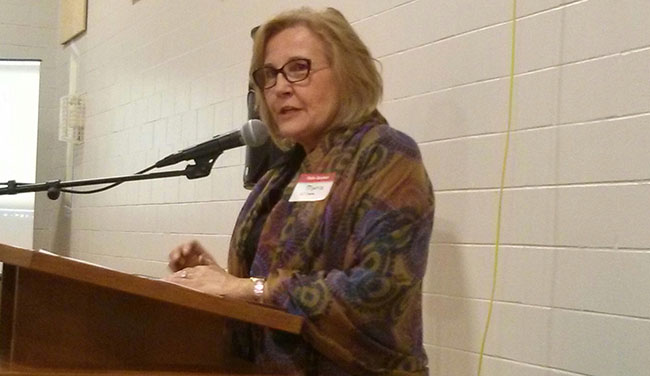TRC Commissioner hopeful with new government

By Colin Graf
AAMJIWNAANG FIRST NATION — One of Canada’s Truth and Reconciliation Commissioners is hopeful the new Trudeau government will make efforts to improve the quality of life for First Nations and promote reconciliation across the country.
Dr. Marie Wilson said Prime Minister-elect Justin Trudeau has “said very important things” about the relationship between aboriginal and non-aboriginal Canadians, and “we will need to hold him to account” for his promises during the election campaign. She was speaking at a public meeting in Aamjiwnaang on Oct. 20.
Trudeau’s promise to act on the 94 recommendations, or Calls to Action, from the Commission is a “hopeful sign” that the new government will take steps to improve relations, she said in an interview following her presentation.
During the Commission’s six years, Canadians have learned some hard lessons from the experiences of residential school survivors, Wilson told the audience of around 300, and are now looking for a more hopeful future. “We’ve learned that we create deep and lasting problems” when one group acts as if it knows best for another, she told the meeting.
A level of suicide among the Inuit that is the world’s worst is another part of the schools’ legacy, she told the meeting. If suicides were happening in another part of Canada at the same rate, it would be described as an epidemic, she said.
The legacy of the residential schools is one of inter-generational pain that can still be seen in the lives of aboriginal people today. She told the story of one woman who testified for Wilson, saying, “You don’t know why your mother can’t take care of you, why she’s full of anger and hate. You end up full of self-loathing…then you find out your mother was sent to residential school. You stop blaming her and you forgive her.”
Holding events like the Sarnia meeting are important to the task of reconciliation, she told the group, with members from both Aamjiwnaang and the city of Sarnia. “I believe this kind of gathering can be a microcosm for a national re-alignment” between First Nations and other Canadians,“ she said.
Schools, police, and child welfare agencies also have a “huge role” to play in reconciliation, according to Wilson. She challenged the audience to read the Commission’s Calls to Action and discuss them with their families, co-workers, and social groups. The recommendations are a “recipe” for reconciliation and are not long. “You can easily read them with your family,” she said.
Religious groups also have a part to play, she told the meeting, co-sponsored by the United Church of Canada. Having “spiritual pride,” and the return of same indigenous people to traditional spiritual practices are important things in healing, Wilson said.
Growing up in the small town of Petrolia, near Sarnia, Wilson remembers putting pennies in the collection plate at Sunday school ‘for the Indian children up north. “
“Never did it occur to me,” she remembers, “that they weren’t with their own families in their own homes.” The story of Indian Residential Schools needs to be taught in all Canadian schools from now on, she said. “This is Canadian history, not just aboriginal history,” Wilson added.
She hopes PM-elect Trudeau will pay special attention to another recommendation that calls on the government to create a National Council for Reconciliation. The Council would make an annual report on whether the gap in quality of life between indigenous and non-indigenous Canadians is improving. Wilson called on the audience to ask their M.P.s to support the Council idea.
The Commission still has work to do before its mandate expires at the end of Dec., including the establishment of a National Centre for Truth and Reconciliation at the University of Manitoba, with on-line portals at other Canadian campuses, allowing students and scholars to access archival documentation about residential schools, Wilson told the audience.


